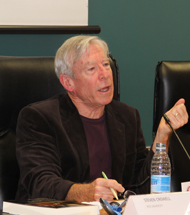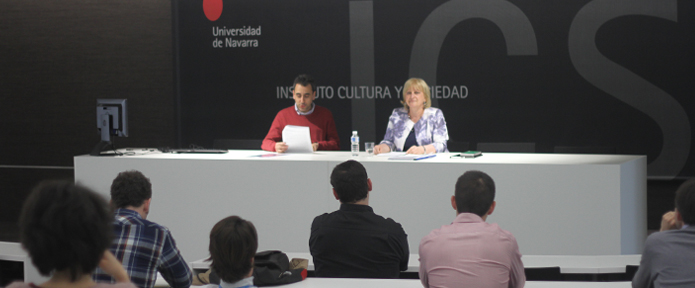"How do we know we don't live in the Matrix is the same question philosophers have been asking since Descartes?"
Steven Crowell, professor at Rice University (USA), reviewed some of the challenges of today's Philosophy at framework of an international meeting organized by ICS.

PHOTO: Elena Beltrán
Steven Crowell, professor of Philosophy at Rice University (USA), participated as speaker in the international workshop 'Ways of Being Bound', organized by the project 'Emotional culture and identity' of the Institute for Culture and Society (ICS) and funded by the Ministry of Economics and Competitiveness of the Government of Spain, in the framework of the subproject 'Bonds, emotions and rationality internship'.
In his lecture he addressed the topic of self-binding, which he defines as "a commitment to be a certain way that guide future actions and binds people to elevate them to what is best."
Among his fields of research is also the European Philosophy of the twentieth century, phenomenology and Nietzsche, among others. In addition, on several occasions he has addressed in his lectures the topic of the public sphere and communication.
In recent times, the Philosophy has lost weight in the Education secondary school in some countries. How do you see the future of the Philosophy in general?
In the U.S. there is almost no Philosophy in secondary school. There is a movement to introduce it and I think it is a worthy goal . Although it's hard to know when is the right time to raise philosophical questions, because it takes a certain maturity to do so, I think high school students are naturally philosophically inclined. They like to ask great questions and debate.
But the future of the Philosophy is much closer to the structural changes that are happening in the university and that tend to emphasize funding issues, which may seem productive, well paid and may attract external funding from scientific institutes. So the Humanities are squeezed by people (parents or students) who want to develop useful skills in the marketplace of work. But this is missing the most important part of Philosophy and Humanities.
My hope is that somehow the culture will redevelop a taste and understanding for Education in a sense of construction or cultivation that comes with deep thinking about philosophical problems or how to interpret literary texts. If not, something essential to our humanity would be lost and we would live in an intervirtual reality instead of reality.
And in particular, how do you see the future of phenomenology, one of your lines of research?
Phenomenology studies the way in which each thing presents itself to me in my first-person experience. I think that if it is taken in a very narrow sense as some particular movements, it aligns with any other movement that is headed under the continental Philosophy : phenomenology, hermeneutics, existentialism, deconstruction, post-structuralism, and so on. But I believe that phenomenology is a way of doing Philosophy, like analytic Philosophy . So I think its future is in the hands of those who consider this way of doing Philosophy to be constructive and instructive. And I see signs that it is widespread, because although many people do not identify themselves as phenomenologists they are doing phenomenology, and in this sense I think the future is bright.
Do you think phenomenology is still relevant in this virtual world?
It's a complicated topic . Phenomenology is relevant wherever we experience something. As I mentioned, it basically studies how each thing presents itself to me in my first-person experience, so the virtual world poses different challenges for explaining the who. I experience myself, for example, interacting with robots trying to identify if I am talking to another person. I also experience interacting with an avatar that is of a person who, from a distance, is adopting an identity that may (or may not) have something to do with who they really are. When I am face to face with someone, I can ask them questions and interpret their body language. However electronically I have very little to do, in terms of how I understand who the real person is (if they are a real person).
How does the virtual world differ from the real world?
I think they are very different, although some say the virtual world is very convincing. There is the whole question of how we know we are not living in the Matrix. This is the same question that philosophers have been asking since Descartes. How do I know that my experience is not all an evil functional demon posing me to have these experiences? Or how do I know that I am not a brain in a jar and everything I experience is being manipulated by a scientist? Nothing I consider real is real at all. I can't go into what answers phenomenology can give to these questions, but they are challenging. Skepticism has always been a challenge for Philosophy. The basic idea is that the scenarios themselves are unintelligible without a non-virtual basis, i.e. with actual reality. You cannot formulate the problem without presupposing the priority of our real experience. (And this is only the beginning of the argument).
Do you think the Internet has changed the meaning of the public sphere?
Yes, but we have mediated the public sphere for a long time. The original Greek notion of the public sphere would be face-to-face democracy, small communities where people make decisions in the agora where they can confront others directly. We haven't had that subject from status for a long time. And I think the Internet has changed the scope of things to an unpredictable global extent. On the one hand it democratizes people, it empowers them, it gives them a voice, we've seen many examples of this. But at the same time, it empowers destructive forces that in the past ended up marginalized. And the marginalization of certain views also seems to contradict the notion of freedom, but if you don't marginalize the lying, false, irresponsible speech somewhere or other, you get political chaos. That's why I think control is also important on the Public discourse unless it's in a very small, face-to-face community where the person making the statement is directly manager of the statement. The Internet erases that responsibility.
Who do you think is now a political actor?
We all are, obviously we don't all have a position, but I think the political actor is the one who is taking a position on something that concerns the polis (city). And at one level or another almost everything we do concerns the polis. What is distinctive about the political is that what I am assuming is who we are or ought to be, so it particularly concerns the constitution of the we. So, the meaning of who we are and what we have to do is the essential domain of politics. Most of the decisions we make have some connections to that constitution of who we are or do reference letter in some way. Of course, this is a very general conception of politics, but it is consistent with the notion of democracy, since the political actor is the individual actor.


